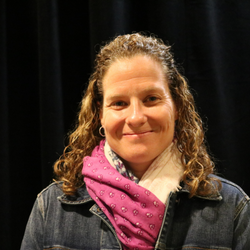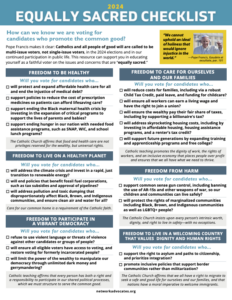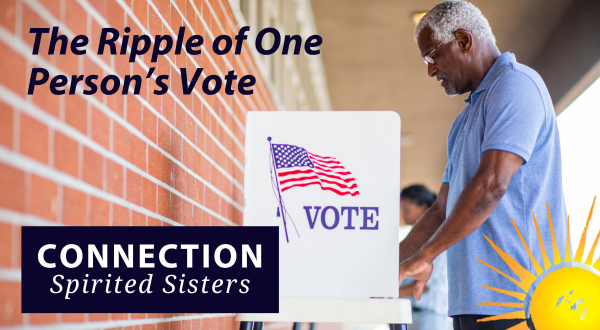
The Ripple of One Person’s Vote
Contribute to the Love That Saves the World
Sr. Erin Zubal, OSU
March 5, 2024

Sr. Erin Zubal, OSU, NETWORK Chief of Staff
Waiting in line outside a school gymnasium in the early morning hours. Feeling the chill of November in the air. Greeting the poll workers. Making selections on an electronic menu screen. The experience of voting is many things, but not many people would probably think of it as helping us grow holiness. But listening closely to Pope Francis, it’s clear that this election year offers yet another opportunity for many people to journey closer to the God who loves and saves the world.
In his 2018 letter on the call to holiness, Gaudate Et Exsultate (“Rejoice and Be Glad”), Pope Francis waded into explicitly political waters when he cautioned against limiting one’s political concern and advocacy to just one or two issues, as so many Catholics tend to do in the U.S. “Equally sacred,” he affirmed, are the lives of people in poverty and all who are rejected and discarded by society. “We cannot uphold an ideal of holiness that would ignore injustice in the world,” he wrote.
That same year, the Vatican’s doctrine office also published a document on “certain aspects of Christian salvation.” This document rejects “individualistic and merely interior visions of salvation” as being against the “economy through which God willed to save the human person.” People must journey beyond themselves, out into the world, to participate in the grace of the salvation story that culminates when “each person will be judged on the concreteness of his or her love.” (Placuit Deo #13)
This, too, is political.

See NETWORK’s 2024 Equally Sacred Checklist to support you in educating yourself as a faithful voter on the issues and concerns that are “equally sacred.”
Voting is concrete. It is an act. It is a choice. It’s an imperfect choice because voters are often not faced with specific policy proposals but with individual office-seekers who may be better on particular issues than others and whose performance, once elected, can be unpredictable. Will they advocate for people on the margins? Are they able to be bought by wealthy corporate interests? Do they take the weight of responsibility of their office seriously? The answers to these questions can and do produce wildly different outcomes.
But what remains is this: In the act of voting, a person creates a small ripple in the social fabric, a ripple that may end up part of a more significant current or movement that impacts the lives of millions of other people– for good or ill.
Using one’s vote for ill often means voting as a means of lashing out against people or groups of people whom voters have been told to fear, such as migrants and other people struggling to survive on the peripheries of society.
Voting may take only an instant, but the harm inflicted by bad immigration policy compounds over the years. It is felt in the lives of families and children who might never recover from the devastation they experience.
Even more could be said about the pain intentionally inflicted on Black and Brown communities by the stoking of Christian nationalist and white supremacist narratives. What does it mean for this country that so many neighbors voted this way?
But the opposite is also possible. A person can use their vote to build up rather than tear down, show welcome rather than hostility, and contribute to love rather than hate. And in an election year that looks to be decided by a small number of people in a few states and localities, the choice of one person to choose solidarity, to make their vote an act of love, is as consequential as it’s ever been. It might just play a part in saving the world.







